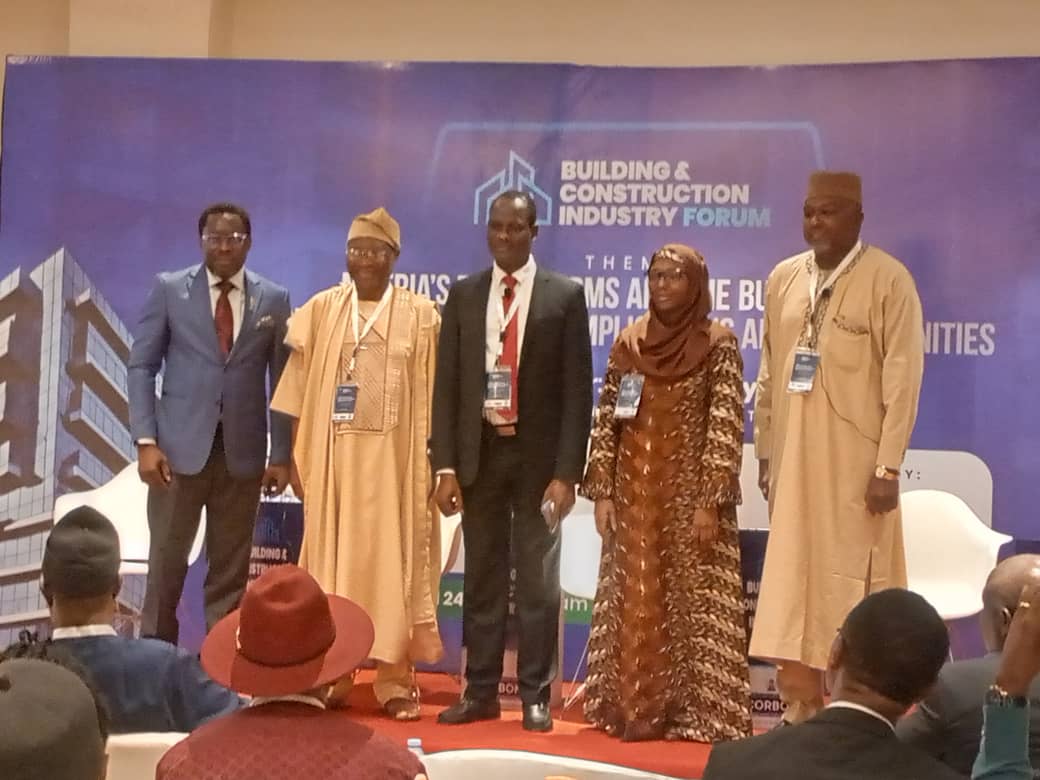888
Daniel Adaji
The construction industry in Nigeria is poised for a major boost as the federal government unveils sweeping tax reforms designed to stimulate growth in critical sectors—chief among them, real estate and infrastructure.
The reforms, central to the Nigeria Tax Bill 2024, were a key focus of the Building and Construction Industry Forum organised by Council for Registered Builders of Nigeria (CORBON) held Thursday in Abuja.
Chairman of the Presidential Committee on Fiscal Policy and Tax Reforms, Taiwo Oyedele during his keynote address said,
“The reforms are designed to improve housing affordability,. They aim to reduce the tax burden across the board—whether you’re buying, building, or selling real estate. This will also provide relief to renters.”
Oyedele stressed that the tax overhaul is geared toward creating a more inclusive, efficient, and growth-driven fiscal system. He outlined key benefits for the construction sector, including tax exemptions for building materials, simplified laws, and incentives to encourage investment and productivity.
“The ultimate goal is to ease financial pressure and stimulate economic activity in the building and construction sector, which, in turn, boosts the overall economy,” he said.
One major policy shift includes categorizing building materials as a priority sector, making them eligible for tax benefits. “This should lower costs, though actual impact will depend on suppliers and manufacturers,” he added.
Oyedele acknowledged challenges such as inflation, high interest rates, and bureaucratic inefficiencies but said reforms were long overdue.
“Our tax system was inefficient, unfair, and growth-inhibiting,” he said.
The new framework aims to correct structural imbalances, eliminate archaic colonial laws, and improve revenue collection without stifling businesses.
Among the features of the reform are tax exemptions for individuals earning below N100,000 monthly and businesses earning under N100m annually, lower withholding tax rates to boost liquidity for enterprises, a streamlined tax structure with a unified legal framework, and global minimum tax provisions for multinational compliance and fairness.
Responding to industry concerns over development bottlenecks, Oyedele pointed out that some matters fall under state jurisdiction.
“Land issues are sub-national. We can’t legislate from the federal level without state cooperation,” he explained.
He also highlighted a new initiative that allows local governments to delegate tax collection, improving trust and efficiency at grassroots levels.
The Committee, he added, is committed to public engagement and transparency. “We’ve consulted with every major sector—from SMEs to artisans—and we’re now producing localized audio versions of tax laws in Nigerian languages to ensure everyone is included,” he said.
“This sector benefits from new infrastructure and tax incentives. Greater access to finance with reduced tax on interest and improved cash flow will attract both local and foreign investors,” he added.
Chairman of CORBON, Dr. Samson Opaluwah, opened the forum with a call for targeted support for the construction industry, especially small and medium-sized enterprises (SMEs).
“The industry is run largely by SMEs, which produce 60 to 70 per cent of the housing stock. Yet they are trapped in a cycle of limited financing and multiple taxation at all levels of government,” he added.
He emphasized that the forum was an opportunity to engage policymakers directly.
“While the reforms aim to generate revenue, we must ensure they do not stifle the very sector they are meant to support. We need policies that grow our capacity to deliver infrastructure and housing,” he said.
Opaluwah welcomed the participation of key government officials and noted CORBON’s role in building public understanding and accountability in the sector.
“As a corporate citizen, we take seriously our responsibility to ensure safe, sustainable building practices for national development,” he said.
Representative of the Minister of Housing and Urban Development, Temitope Gbemi described the Nigeria Tax Bill 2024 as a bold legislative reform aligned with the president’s Renewed Hope Agenda.
“This bill is aimed at simplifying, harmonizing, and consolidating our tax laws. It supports job creation, local sourcing, and financial inclusion—especially for those in the informal construction economy,” he said.
Gbemi emphasised that expenses like rent, wages, and materials would now be deductible, giving firms financial breathing room. He noted that contractors who document costs efficiently will benefit most from the new framework.
“This is a blueprint for industrial revival. The Ministry is aligning housing policy with fiscal reforms to attract private sector investment in real estate and infrastructure,” he added.
He also highlighted the formalization of informal sector workers through presumptive taxation and access to financial services.
“This opens doors for artisans, subcontractors, and tradespeople previously excluded from formal credit systems,” he said.
Executive Director of the Housing Development Advocacy Network (HDAN), Festus Adebayo urged the government to ensure reforms translate into real impact—particularly for low-income housing.
“The construction sector hasn’t yet felt the effects of previous tax reforms,” Adebayo said.
“We need concrete incentives for developers to build affordable housing, not just promises,” he added.
He acknowledged Oyedele’s assurances about tax relief for SMEs and real estate actors but raised concerns over lingering bureaucratic roadblocks.
“In some states, developers must deal with up to 12 agencies and fees before starting a project. Under such conditions, affordability is a myth,” he warned.
“We formally asked the government to include incentives—tax rebates or reliefs—that make it viable for developers to focus on low-cost housing,” Adebayo stated.
The message from the stakeholders echoed: the reforms present an unprecedented opportunity to reshape the sector, but implementation must be practical and inclusive.
Stakeholders are now calling for continued dialogue, transparency, and measurable outcomes to ensure the reforms do not merely exist on paper, but translate into sustainable growth and development.



